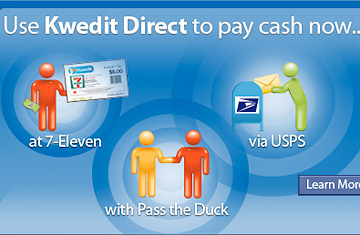
Any TV exposure should be a boon to a budding Internet startup. But Kwedit had the misfortune to have that exposure come on The Colbert Report. The site, a processor of online micropayments, got lambasted by Stephen Colbert in a four-minute segment over charges that the site's unique — and controversial — payment model makes it easy for kids to get credit online, no parental approval necessary.
It's part of a persistent image problem the site has had since it launched in February. Part of Kwedit's business model is a service called Kwedit Promise, which extends small amounts of credit for use in buying virtual goods online. Users can get a few dollars to buy a new toy for their digital dog, for example, in games like Foo Pets, in exchange for a pledge to pay the money back later.
Weird? Certainly, but it's a big market: virtual goods were a $1 billion industry worldwide in 2009, and Kwedit is one of a slew of payment providers that have cropped up in early 2010 to try and get a piece of the pie. But Kwedit Promise is unique, and disquieting enough to draw Colbert's ire. "I know that it sounds like a website that hooks little kids on borrowing credit, so let me explain," Colbert said on his March 4 broadcast. "It's a website that hooks little kids on borrowing credit."
Except it really isn't, says founder Danny Shader. "We don't extend credit and we don't have kids using our site," Shader says. What wasn't communicated in Colbert's piece and wasn't immediately clear in the press coverage of Kwedit is that the company does have some baseline rules. Users have to be older than 13 to use the service, and any promises made are nonbinding. Don't expect debt collectors to hound your teenager over his online gaming bill, either: he'll simply be unable to use Kwedit again if he doesn't pay up, either by mailing in cash to the company or by settling the tab in person at a 7-11, the company's off-line partner. Repayment rates are low, but Kwedit can afford that: since the service is only offered for virtual goods, merchants aren't out anything tangible if someone fails to pay.
Shader says he envisioned Kwedit Promise as a risk-free way for teens to learn about credit, absent the nasty consequences that can come from making mistakes on a first credit card. Users receive a Kwedit score (modeled after the FICO credit scores) based on their responsibility. Those who pay the debt on time get more credit to use on virtual goods. "We don't let a teenager get behind the wheel of a car without a learner's permit," Shader says. "Why do we let students get a bunch of credit-card apps?"
Still, the company took steps to immediately distance itself from any charges they're catering to kids. The company's cartoon mascot, Kweddy the Duck, was ditched in a bout of post-Colbert "de-duckification," and Shader wrote an extended blog post to try and clear up any misconceptions about his service. Shader says the company also replied to every angry tweet and e-mail they received after Colbert's lambasting. "It didn't feel good personally, but the good news is thoughtful people gave us critiques of the service," Shader says.
But if the company can survive the body blow — and Kwedit says it received a number of inquiries along with the hate mail — the underlying model is actually pretty interesting. Shader says the company's target isn't tweens but the broader (and older) segment of online users who don't use credit cards. "If you have cash — and that's a huge portion of the population that wants to pay with cash — your alternatives aren't all that great," Shader says. A separate service, dubbed Kwedit Direct, lets these people purchase tangible online items and pay for them using currency at a 7-11. The merchant only ships the item when it receives notice a payment has been made.
Ultimately, Shader says that model might end up being the driver behind Kwedit's growth. He envisions the system being used for items including gifts, short-term insurance policies and credit on VoIP telephone service. "We want to cater to the unbanked," he says. So long as they're 13 and up.
